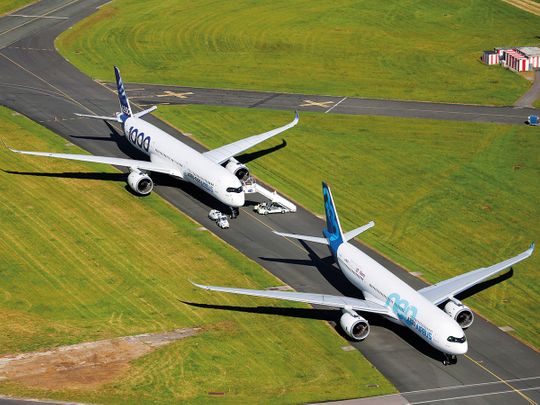No respite: Airbus chief warns of worse to come

Not going anywhere... Airbus could be making more drastic production cuts than they have announced so far. The CEO says there is no escaping some tough decisions.
Toulouse: Airbus SE chief Guillaume Faury warned employees that the planemaker is “bleeding cash” and needs to quickly cut costs to adapt to a radically shrinking aerospace industry.
With airline customers fighting to survive and unable to accept new aircraft, Airbus is juggling its delivery schedules while reassessing its long-term outlook for the aerospace industry, Faury told staff in a letter. A plan to slash production by one-third announced earlier this month may not reflect the worst-case scenario, he said.
“We’re bleeding cash at an unprecedented speed, which may threaten the very existence of our company,” Faury wrote. “We must now act urgently to reduce our cash-out, restore our financial balance and, ultimately, to regain control of our destiny.”
The European manufacturer and its US rival Boeing Co. are trying to come to grips with a plunge in demand caused by the coronavirus pandemic that’s rocked a commercial aerospace industry they dominate. Airbus has increased its liquidity by 15 billion euros ($16.2 billion) to weather the crisis, while Boeing is in talks for US aid. Both companies are preparing for job cuts as they seek to gauge the depth of the downturn and the pace of the recovery.
The Embraer deal dissolve
Boeing on Saturday walked away from a $4.2 billion plan to combine its jetliner business with Brazil’s Embraer SA. The Chicago-based company is expected to cut Dreamliner output by about half and announce workforce reductions with its scheduled first-quarter earnings report. Its CEO has warned of a “new reality” as he assesses the rapidly changing market.
Airbus came into the crisis healthier, and the collapse of Boeing’s Embraer deal strengthens the European company’s advantage in the important market for narrow-body aircraft, where volumes have been much higher.
Still, as with airlines, the crisis represents a mortal threat to the planemakers and their vast constellation of suppliers who’ve also been thrown into imbalance. Getting the math right on how far to cut back will determine the manufacturers’ health when a smaller industry emerges from the ruins.
“The aviation industry will emerge into this new world very much weaker and more vulnerable than we went into it,” Faury said.
Steep cuts ahead
The company chief has said that Airbus plans to assess production on a monthly basis as it seeks to take a realistic view of what is likely to be a long-lasting crisis.
Agency Partners analyst Sash Tusa expects the European manufacturer will ultimately have to cut production by a further 30 per cent to match the likely fall in demand for aircraft over the next two to three years.
Conserving cash is key. The two planemakers likely burned through record amounts in the first quarter: 6.5 billion euros for Airbus and $8 billion for Boeing, according to calculations by Melius Research analyst Carter Copeland.
Airbus has already postponed plans to add another assembly line for the A321 narrow-body at its headquarters campus in Toulouse, France, and slowed the ramp-up of its newest jet, the smaller A220 single-aisle. On Friday, the company mothballed its E-Fan X project with Rolls-Royce Holdings Plc. for hybrid-electric powered aircraft.
The company has taken actions such as furloughing about 3,000 French staff, though Faury said that more far-reaching measures may be needed.

Comments